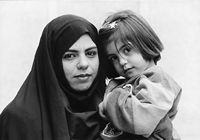
|
 |
Divorce
Iranian Style
|
UK,
IRAN / 1998 / English, Persian / Color / 16mm / 80 min
Director: Kim Longinotto, Ziba Mir-Hosseini
Photography, Producer: Kim Longinotto
Editing: Barrie Vince
Sound: Christine Felce
Narration: Joanna Rosenthall
Production Company, Source: Twentieth Century Vixen
13 Aubert Park, London N5 1TL, UK
Phone & Fax:44-171-359-7368

|
|
Kim
Longinotto
Studied filmmaking at the National Film and Television School in UK.
While there, she made Pride of Place a critical look at her
boarding school. Her films include Cross and Passion, Underage,
and Tragic But Brave. Together with Claire Hunt she made Fireraiser,
Eat the Kimono about dancer-activist Hanayagi Genshu, Hidden
Faces, and The Good Wife of Tokyo. With Jano Williams she
made Dream Girls about the Takarazuka revue in Japan, and Shinjuku
Boys about women in Tokyo who choose to live as men. She is currently
making a film about women in Japan for the BBC.
Ziba
Mir-Hosseini
Iranian anthropologist who lives in London. She is a researcher and
consultant on gender and development issues. Has done extensive fieldwork
in Iran and Morocco including research in Tehran family courts. Her
first book, Marriage on Trial is a study of Islamic family law in
Iran and Morocco. Her latest book, Feminism and the Islamic Republic:
Dialogues with the Ulema, is forthcomming from Princeton University
Press. 
|
The building has two entrances. Men stride resolutely up the stairs
through one, while the shadows of prostrated women, bodies swathed
in chadol, flicker in the other. The commanding presence of such a
family court, one which does not conceal but flaunts gender-based
double standards, symbolizes the deeply-stratified structure of discrimination
in Iran, and gives a glimpse into the sufferings of women forced into
the abyss.
In Iran, where men are allowed to divorce freely but women denied
this privilege, a "wife" must wager her entire life when
she files for divorce. Deprived of rights, women wave the hem of the
chadol, symbol of oppression, and call out, cry and sue as long as
their voices hold out, clinging onto pale hopes as though thirsting
for freedom.
With her new film, Longinotto, known for making films exclusively
with women, teams up with anthropologist Mir-Hosseini to take on this
difficult issue, and the results more than surpass all expectations.
The film's coolly disengaged images not only lament the pain of the
weak and the oppressed condition of victims of discrimination, but
contain the deeply-rooted power to lift up the will and future of
women. The faces behind the impersonal chadol are enriched as they
call for rights, and a concealed but fierce individuality begins to
shine.
By refusing to end discussion at problems with the family system alone,
Divorce Iranian Style is a work rich in valuable suggestions for
new ways to see the meaning of freedom. [Kogo Tomoe]
Directors'
Statements
Kim Longinotto
After Salman Rushdie went into hiding, there were quite a few documentaries
and news reports made about Iran and shown on television in Britain.
They were all hard current affairs stories and about things like the
mothers of martyrs, the revolutionary guard, ayatollahs and fatwas.
And then, about the same time, we started to see Iranian fiction films
in Britain, films by directors like Kiarostami, and these were lyrical,
gentle, personal films about ordinary people. It seemed as if the
two kinds of films were coming from completely different countries.
I became determined to make a feature length film showing individual
Iranian women that a British audience would be able to relate to and
feel close to. When I met Ziba and she told me about her research
in the divorce courts, it seemed an ideal subject. It took us two
and a half years to get permission to make the film.
Ziba Mir-Hosseini
The idea of making Divorce Iranian Style was born in early
1996 when Kim Longinotto and I met. We were both frustrated by Western
media stereotypes of the Muslim world, and Kim had for some time wanted
to make a film in Iran. She had read my book, Marriage on Trial
about divorce under Islamic law and proposed that we make a film on
this theme. As an Iranian and an anthropologist, I welcomed the idea
and we decided to work together.
The film is about the pain - and comedy - involved when marriage breaks
down. It follows the stories of six ordinary women who are going through
a difficult phase in their life. They use whatever they can - wit, charm,
patience, reason, arguments, pleas for sympathy - to get what they want.
|
  |
|
before  next next |
COPYRIGHT:Yamagata International Documentary Film Festival Organizing Committee |